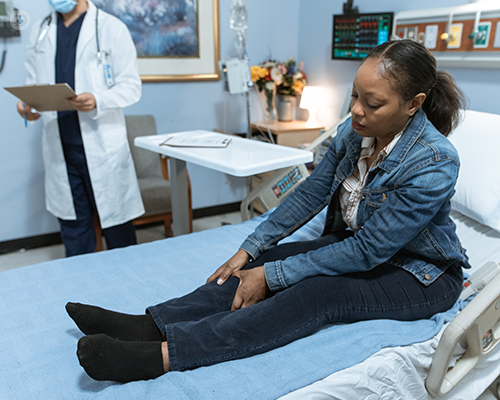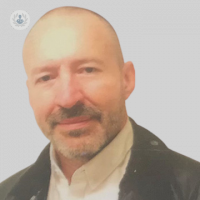Varicose veins: Why do they appear and how are they treated?
Written by:Varicose veins are a common condition, especially amongst women, that can cause pain, discomfort and swelling in one’s legs.
Here to provide an expert insight into varicose veins, including causes and treatment, is Mr Benjamin Lindsey, renowned consultant general general, vascular and renal transplant surgeon.

What causes varicose veins?
Varicose veins are very common. Often, a person inherits them from their parents or their grandparents, so there's a tendency for the walls of the veins that transport blood from the feet back up to the heart to dilate.
One of the reasons this occurs is because the valves (which are a series of non-return swing doors that close when a person stands up to counteract the effect of gravity) fail and don't close properly. This causes the veins that are visible in a person’s legs to become dilated, unsightly - and more importantly - cause symptoms. These symptoms can include pain, achiness, heaviness, and the skin over the varicose veins at the level of the ankle (which is the part of the body exposed to most of the effect of the head of pressure) becoming dry, eczematous and itchy.
What happens if you don’t treat varicose veins?
There are many people with varicose veins that don't cause any symptoms. However, the small group of people who become more troubled by the unhealthy condition of their skin (due to the varicose veins) will potentially develop ulcerations of the ankle in the future.
An ulcer is simply a breakdown in the skin. It's one of the most common causes of a leg ulcer, outside diabetes and arterial disease, and requires treatment. This can be by conservative medical management in which the veins are treated without having them removing (for example, by wearing a compression stocking) or by getting rid of the varicose veins that contain the failed valves.
How do you treat varicose veins?
The first treatment option is a non-operative approach, which simply involves wearing Class II graduated compression stockings to the level of below the knee. This is a good measure for a short period of time, but with hot weather or with hand conditions (for example, arthritis) it can be difficult to get these stockings on and off, every day, morning and night.
Thus, the best way - if a person is fit enough to undergo the procedure - is to have one’s varicose veins removed. For the first 15 years of my medical career, removal would involve physically stripping the veins out.
Nowadays, rather than stripping the vein out, removal requires the walls of the vein to stick together by heating up the inside of the vein either with a laser or a radiofrequency device. After causing a thermal injury in the walls of the vein, the walls are then stuck together using a compression stocking, which is to be worn for five to seven days after treatment. This means that although the vein isn’t removed from a functional point of view, the vein is no longer working nor exposing the skin at the ankle to the unhealthy head of pressure caused by the failed valves.
Besides varicose vein removal, what other vascular surgery do you also perform?
Vascular surgery is grossly divided into minimally invasive and endoscopic surgery, which have evolved as a result of using stenting technology.
I, however, am an open vascular surgeon, so I will perform open abdominal surgery, aortic aneurysm surgery, carotid surgery, and low limb bypass surgery for people who have health issues with the blood supply to their feet.
As well as this, I also support other surgeons in other specialties who perform operations which are close to or nearby vascular structures, large veins, or large arteries, where vascular support is needed in case there’s an issue with either bleeding or clotting.
What other non-vascular surgery do you also perform?
My FRCS qualification is in general and vascular surgery, and I’m lucky enough to have been trained at a time when general surgery was a true general surgical specialty.
In the world of general surgery - in my NHS practice - I look after people with renal failure, including people with inguinal hernias, abdominal wall hernias, incisional hernias, and lumps and bumps of the skin.
In addition, I’ve also been lucky enough to have trained as a transplant surgeon. Thus, as well as doing kidney transplants, live donor nephrectomies and transplanting those kidneys into a recipient, I also carry out dialysis surgeries. This includes creating fistulas for dialysis and placing peritoneal dialysis catheters.
Mr Benjamin Lindsey is a highly skilled consultant with more than 30 years of experience.
If you require treatment for varicose veins or any of the mentioned surgery, do not hesitate to visit Mr Lindsey’s Top Doctors profile today.


